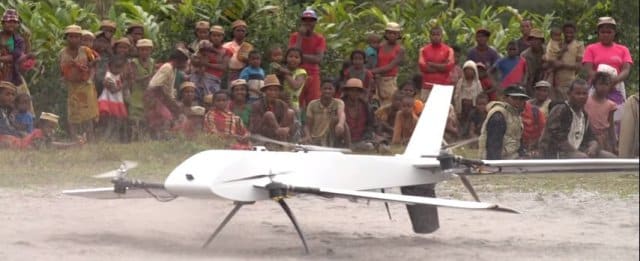While drones are thought of mostly as weapons of war, the robotic, unmanned aircraft may play a life-saving role in remote regions that do not have access to health care. In Madagascar, the American medical drone manufacturer Vayu, Inc., and New York’s Stony Brook University, are testing use of drones to deliver medicine and equipment to remote areas. According to Dr. Peter Small, founding director of the university’s Global Health Institute, 70 percent of the population of the island that lies off east Africa live in very rural settings, including a significant number who dwell in remote settings that can only be reached by foot. “These are places that are only accessible on foot; you can’t even get a bicycle there. By using drones we can not only fly out to villages, but collect diagnostic specimens and deliver care,” Small told Digital Trends. “It is really revolutionary.”
University, country in longstanding partnership
Stony Brook University has a longstanding relationship with Madagascar, which has one of the most important and diverse ecosystems in the world. For three decades, scientists and students at Stony Brook’s ValBio Center, a 15,000-square- foot research station, have worked the island residents to bolster conservation efforts while improving residents’ quality of life. The center is located on the edge of Madagascar’s Ronamafana National Park. The university’s Global Health Institute, which has a $10 million endowment, is teaming up with Vayu, Inc., a Michigan aviation company that was launched in 2014. With more than $1.1 million in investment, the start up is focused on building affordable drone technology to provide medical aid and supplies across rugged terrain and during times of disaster. The drone can take off and land like a helicopter and is able to fly long distances.
Long-range mission accomplished
With the backing of Madagascar’s government and the U.S. Agency for International Development, the project recently achieved the world’s first long-range, autonomous drone flight. The drone collected blood and stool samples from rural villages and flew them to the ValBio center for testing. Small said the potential of drone technology to improve health care in remote areas is enormous. For example, he said a health worker who cannot diagnose a cough in a patient might be able to use a beacon to call a drone. The drone could then collect a sputum sample and fly it to lab for diagnosis then fly medications back to the patient’s location. The entire operation might take as little as a couple of days, he noted. “Drones will find innumerable uses, such as accelerating diagnosis of tuberculosis and ensuring delivery of vaccines,” Small said. Tuberculosis and many other diseases that plague developing countries, require diagnosis in a lab and stool and blood samples must be transported quickly. That is why it is critical in places like Madagascar to find an alternative to cumbersome travel by road or pathway.
Global impact likely
The organizers believe their partnership will produce significant progress in delivering quick diagnosis and medications for remote communities that lack health care professionals or facilities. Vayu in particular was founded with the purpose of developing drones for medical transport in hard-to- reach areas. “Vayu’s accomplishment is significant for public health in developing countries, where limited access hinders healthcare and it is for the future of autonomous unmanned vehicles,” said Vayu’s CEO, Daniel Pepper, a former international journalist and medical student-turned- founder of Vayu. The project could have global impact. Stony Brook University President Samuel L. Stanley Jr., MD, a nationally renowned expert in emerging infectious diseases, believes that the benefits of this partnership will likely expand well beyond Madagascar. “Global health is an immediate problem for everyone,” he said, noting that commonplace air travel has shattered natural isolation. “Advances in health delivery and implementation (in other parts of the world) can have positive impacts in the U.S. as well. The benefits of promoting health worldwide are immense.” A similar effort is already under way in Rwanda, were a Silicon Valley start up is using drones to deliver medicine and blood to patients. Zipline International said the unpiloted aircraft will transport supplies to hospitals and medical centers around the country, forming the world’s first national drone delivery system. Zipline International said it plans to expand the service to other countries later this year.

